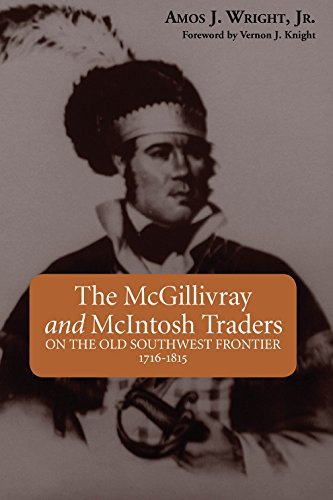

Full description not available
T**S
definitive work on the McGillivray's in colonial Georgia
This is the most definitive, detailed source I have found for the McGillivray family of colonial traders and the Creek Indian chief in what is now Alabama. It explodes some myths and sheds new light on the subject and I consider it a must for any serious Alabama or colonial Georgia history student.This is a no non-sense, very detailed study.It gives intimate details on Lochlan and Alexander McGillivray.There are many extant theories on how Lochlan McGillivray found his way to Alabama from Scotland but you will see that Wrights study here is exhaustive and in my opinion accurate as can possibly be. You will see that the McGillivray family was already well established in the Creek trading business by the the time he comes to America and thus the myth of Lochlan being poor and an indentured servant is exploded. The McGillivrays were a prominent family in Scotland and were trading with the Creek Indians in Alabama by 1730 and possibly as early as 1715 as British trading among the Creeks in Alabama dates to 1680 long before the French establish themselves at Mobile.Thus, Lochland comes to the colonies to work for a family business and there is no indication that he was ever poor nor lacked education as he was very industrious and educated.This book shows us that several McGillivrays of the same family were trading out of Charleston, Savannah, Little Tallassee, Augusta, Mobile,and other places.The facts presented are detailed and tedious and it took me several readings and note taking to get it fixed in my own mind! The McGillivray family tree is complicated and some of the conclusions are deduced from the intensive research done by the author. There is also a portion on the cause of death of Alexander McGillvray that is very interesting as this subject is still debated. His family took a position that he was poisoned by the Spanish governors for political reasons.
R**S
What happens when you mix Scottish and Indian blood
Wright gives great insight into two of the families that effected the Creek Indians. He traces the two families to their Scottish ancestors while giving insight into the events prior to Creek Indian removal to Oklahoma. An excellent source for understanding the Creek Indians and the United States during the period between the Revolutionary War and their removal.
E**C
If you need the information, read it. If not, spare yourself.
This book is both invaluable and infuriating. The author goes to great lengths to find and verify information but is utterly incapable of organizing it into any kind of coherent whole. Admittedly, covering the great number of families and traders active over a hundred year period in a vast section of the old and new world is an all but impossible task, but surely some method other than the almost random wanderings between territories, times and family connections could have been found. At very least the author might have refrained from such wild digressions as going into the whole two hundred and fifty year history of the school in Banff, Scotland to which young Aleck McGillivray, the third generation of this family, was sent- particularly since we have virtually no information about the young man himself. At very least such information could have been put in a footnote. I know I can't expect every historian or biographer to be a Caroline Morehead or a William Dalrymple, but surely some vestige of order- a few genealogical charts or time lines, for instance- isn't too much to ask.
M**T
Detailed and insightful scholarly work
A must read about the Creek Indians in the American Southeast and their controversial relationship with british traders in the late eighteenth and early nineteenth century.
S**N
Fresh Details on Two Powerful Families of the Old Southwest
Even though Wright's book is not the first and cannot be considered the definitive work on the McGillivray and McIntosh families, it still is a valuable volume as it provides hereunto unpublished historical details and corrections to previous works. (The individual who will benefit most from this book will be the one who has read Edward Cashin's 'Lachlan McGillivray: Indian Trader' and John Caughey's 'McGillivray of the Creeks'.)Wright's greatest contributions are: (1) providing information on other members of the McGillivray Clan, in addition to Lachlan and son Alexander, who were resident and active in the Old Southwest; (2) presenting documentation that sheds greater light on the fate of Alexander McGillivray's only son, Alexander Junior; and (3) giving information on the lives and families of Lachlan's less famous daughters.Be aware that Wright only spends one chapter on the McIntosh family. His primary subject matter is Lachlan McGillivray and Alexander McGillivray.
L**S
One of the best volumes on Alexander McGillivray to date
This is one of the most fascinating books I have read on the subject of Alexander McGillivray and his family. New theories on his death with strong arguments and documentation give new insight on his impact and influence on the Creek Nation in regards to the Spanish and their distrust of him. Alexander McGillivray has long been overlooked as a great Indian Chief, trying to keep peace in the Creek Nation while keeping the powers of the Spanish, British and Americans at arms length.
T**X
amazing detail, weak analysis
The McGillivray and McIntosh Traders: On the Old Southwest Frontier 1716-1815 This book is full of genealogical detail resulting from 20 years of research, but it is weak in analysis, fails to put the subject in the context of current understanding of Native American societies in the Old Southwest, and shows little knowledge of the Scottish clan system from which these traders came. It provides leads to rich documentary sources, but is a means to understanding rather than an end.
Trustpilot
3 days ago
2 days ago